Molasses sugar is a dark brown, almost black, moist granular sugar. It can be used interchangeably with muscovado, but molasses sugar has a stronger taste as compared to muscovado. Its distinctive molasses taste is due to its high content of molasses. Nutritively, it has high iron content. Molasses sugar is often used in chutneys, pickles, and marinades, as well as in Christmas cakes.

Sugar is the generic name for sweet-tasting, soluble carbohydrates, many of which are used in food. Simple sugars, also called monosaccharides, include glucose, fructose, and galactose. Compound sugars, also called disaccharides or double sugars, are molecules made of two bonded monosaccharides; common examples are sucrose, lactose, and maltose. White sugar is a refined form of sucrose. In the body, compound sugars are hydrolysed into simple sugars.
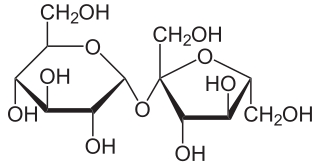
Sucrose, a disaccharide, is a sugar composed of glucose and fructose subunits. It is produced naturally in plants and is the main constituent of white sugar. It has the molecular formula C
12H
22O
11.
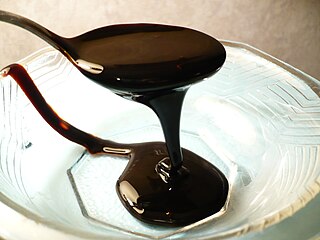
Molasses is a viscous byproduct, principally obtained from the refining of sugarcane or sugar beet juice into sugar. Molasses varies in the amount of sugar, the method of extraction and age of the plant. Sugarcane molasses is usually used to sweeten and flavour foods. Molasses is a major constituent of fine commercial brown sugar.

Baked beans are a dish traditionally containing white common beans that are parboiled and then, in the US, baked in sauce at low temperature for a lengthy period. Canned baked beans are not baked, but are cooked through a steam process.

Jaggery is a traditional non-centrifugal cane sugar consumed in the Indian subcontinent, Southeast Asia, Central America, Brazil and Africa. It is a concentrated product of cane juice and often date or palm sap without separation of the molasses and crystals, and can vary from golden brown to dark brown in colour. It contains up to 50% sucrose, up to 20% invert sugars, and up to 20% moisture, with the remainder made up of other insoluble matter, such as wood ash, proteins, and bagasse fibres. Jaggery is very similar to muscovado, an important sweetener in Portuguese, British and French cuisine. The Kenyan Sukari ngutu/nguru has no fibre; it is dark and is made from sugarcane and also sometimes extracted from palm tree.

A sugarloaf was the usual form in which refined sugar was produced and sold until the late 19th century, when granulated and cube sugars were introduced. A tall cone with a rounded top was the end product of a process in which dark molasses, a rich raw sugar that was imported from sugar-growing regions such as the Caribbean and Brazil, was refined into white sugar.
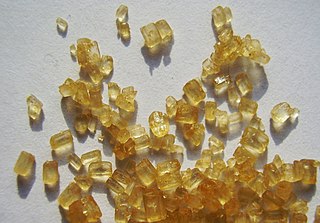
Brown sugar is a sucrose sugar product with a distinctive brown color due to the presence of molasses. It is by tradition an unrefined or partially refined soft sugar consisting of sugar crystals with some residual molasses content, but is now often produced by the addition of molasses to refined white sugar.

Kilju is the Finnish word for home made alcoholic beverage typically made of sugar, yeast, and water. The ABV is around 15–17%, and since it does not contain a sweet reserve it is completely dry. Crude fermented water may be distilled to moonshine. Kilju for consumption is clarified to avoid wine fault. It is a flax-colored alcoholic beverage with no discernible taste other than that of ethanol. It can be used as an ethanol base for drink mixers.

Golden syrup or light treacle is a thick, amber-coloured form of inverted sugar syrup made by the process of refining sugar cane or sugar beet juice into sugar. It is used in a variety of baking recipes and desserts. It has an appearance and consistency similar to honey, and is often used as a substitute where honey is unavailable.
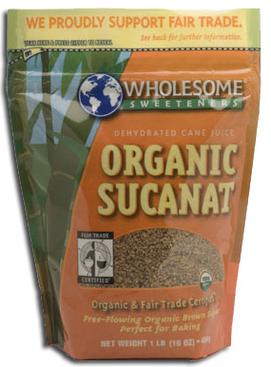
Sucanat is a brand name for a variety of whole cane sugar that was introduced by Pronatec in 1978. Like panela and muscovado, Sucanat retains its molasses content. It is essentially pure dried sugar cane juice. The juice is extracted by mechanical processes, heated, and cooled, forming small brown grainy crystals.

Muscovado is a type of partially refined to unrefined sugar with a strong molasses content and flavour, and dark brown in colour. It is technically considered either a non-centrifugal cane sugar or a centrifuged, partially refined sugar according to the process used by the manufacturer. Muscovado contains higher levels of various minerals than processed white sugar, and is considered by some to be healthier. Its main uses are in food and confectionery, and the manufacture of rum and other forms of alcohol. The largest producer and consumer of muscovado is India.
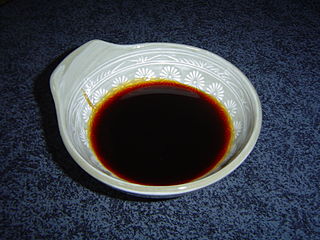
Date honey, date syrup, date molasses, Debes, or rub is a thick dark brown, very sweet fruit syrup extracted from dates. It is widely used in Middle Eastern cuisine and Maghrebi cuisine.

Sugarcane or sugar cane is a species of tall, perennial grass that is used for sugar production. The plants are 2–6 m (6–20 ft) tall with stout, jointed, fibrous stalks that are rich in sucrose, which accumulates in the stalk internodes. Sugarcanes belong to the grass family, Poaceae, an economically important flowering plant family that includes maize, wheat, rice, and sorghum, and many forage crops. It is native to the warm temperate and tropical regions of India, Southeast Asia, and New Guinea.

Rum is a liquor made by fermenting and then distilling sugarcane molasses or sugarcane juice. The distillate, a clear liquid, is often aged in barrels of oak. Rum originated in the Caribbean in the 17th century, but today it is produced in nearly every major sugar-producing region of the world, such as the Philippines, where Tanduay Distillers, the largest producer of rum worldwide, has its headquarters.
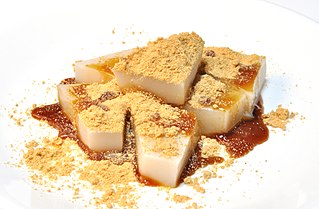
Kuromitsu is a Japanese sugar syrup. It is similar to molasses, but thinner and milder.
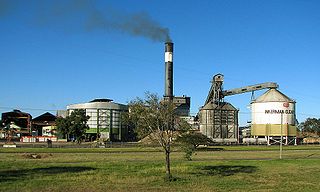
A sugar cane mill is a factory that processes sugar cane to produce raw sugar or plantation white sugar. Some sugar mills are situated next to a back-end refinery, that turns raw sugar into (refined) white sugar.
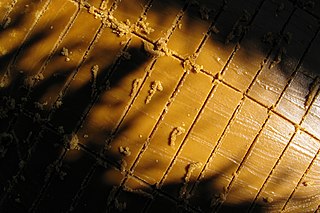
Non-centrifugal cane sugar (NCS) is the technical name given to traditional raw sugar obtained by evaporating water from sugarcane juice. NCS is internationally recognized as a discrete and unique product by the FAO since 1964 and by the World Customs Organization (WCO) since 2007. WCO defines NCS as "cane sugar obtained without centrifugation". It also states that "the product contains only natural anhedral micro-crystals, of irregular shape, not visible to the naked eye, which are surrounded by molasses' residues and other constituents of sugar cane". NCS is produced in most sugarcane-growing regions of the world, being known by many different names such as panela, jaggery, or gur. Some varieties of muscovado are non-centrifugal.